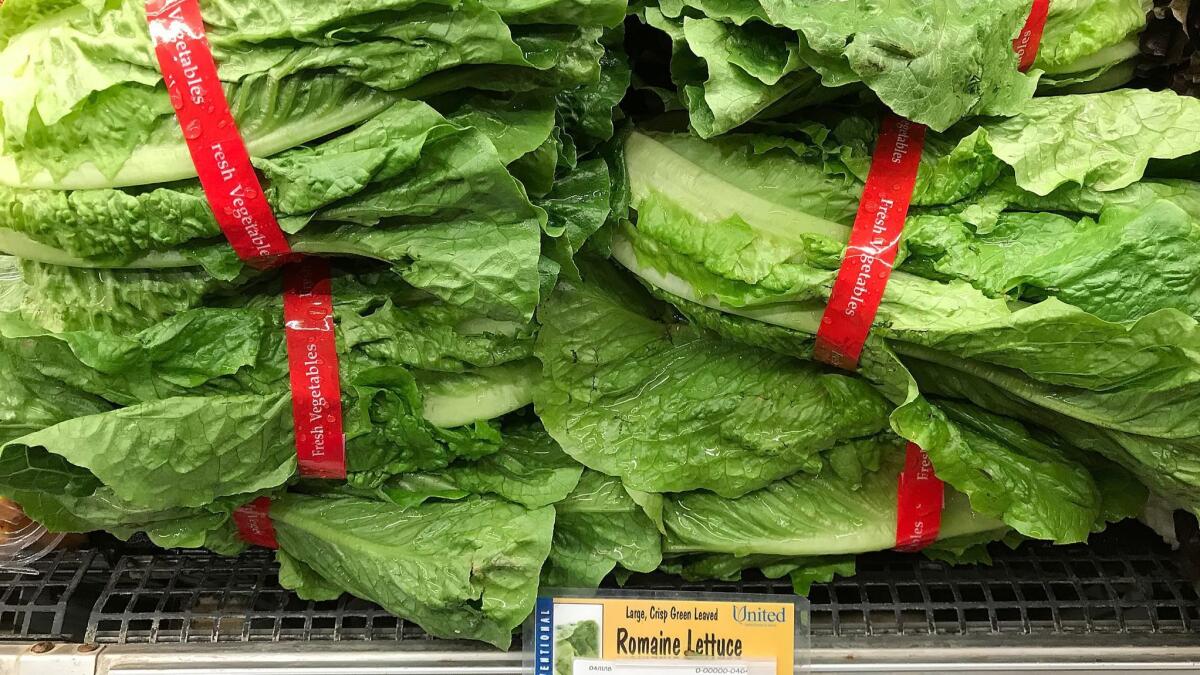Romaine lettuce recalled nationwide due to E. coli bacteria outbreak

Federal health officials are advising consumers to throw away romaine lettuce and salad mixes amid a nationwide outbreak of E. coli infections linked to Californiaâs Salinas Valley.
Forty people in 16 states have been sickened, 28 of them seriously enough to require hospitalization, the U.S. Centers for Disease Control and Prevention said Friday.
If consumers canât verify the origin of romaine or mixes containing the variety, they should discard it, the CDC urged. These include whole heads, hearts, pre-cut packaged lettuce and salad mixes, including baby romaine, spring mix and Caesar salad, the agency said.
The warning marks the second consecutive Thanksgiving surprise for consumers. Last year, shoppers were steered away from lettuce linked to Californiaâs Central Coast growing regions, after it was linked to an illness that sickened 43 people in 12 states around the holiday.
The move comes after Maryland health authorities linked recent illnesses to a Caesar salad mix distributed by a New Jersey-based food company, Missa Bay, LLC, which voluntarily recalled approximately 75,233 pounds of salad products, according to the U.S. Department of Agricultureâs Food Safety and Inspection Service.
âThe products identified are already significantly past their use-by dates, so this voluntary recall most likely does not affect any product currently on store shelves. We are working with our retailers to help ensure that this is the case,â the company said in a written statement.
California lettuce industry officials expressed frustration at yet another recall, after a devastating series of illness outbreaks drove consumers away from their produce last year. Growers in California and adjacent areas of Arizona this year began more clearly labeling the origin of their produce in an effort to limit economic damage from broad recalls and health advisories, said Scott Horsfall, chief executive of the California Leafy Greens Marketing Agreement, a food safety program created in 2007 in response to produce-related outbreaks.
âRight now, romaine is being harvested in Arizona and Southern California growing areas that are not part of this outbreak and harvest is nearly complete in the Salinas Valley,â Horsfall said in a written statement. âRomaine producers will be working closely with their customers to make sure all product from Salinas is removed from marketing channels, but romaine from any other growing area is safe for consumption.â
The latest recall follows a belated announcement last month that 23 people in 12 states were sickened by fecal bacteria traced to romaine lettuce between July and early September.
Last yearâs Thanksgiving outbreak hit the industry just as it was recovering from another rash of foodborne illnesses that had killed five people and sickened more than 200, the worst multistate E. coli outbreak in a decade. That spring incident and a second outbreak tied to the Central Coast that sickened more than 50 people in multiple states drew pledges from the FDA to more closely monitor produce from the California-Arizona winter growing regions.
Illnesses from the Shiga toxin-producing E. coli bacteria generally strike three to four days after contact. Symptoms include diarrhea, severe stomach cramps and vomiting, according to the CDC.
The recalled salad products have âUse Byâ dates ranging from Oct. 29, 2019, to Nov. 1, 2019, according to the CDC, and include the number âEST. 18502Bâ inside the USDA inspection mark.
A full list of recalled products is available on the USDA website.
More to Read
Inside the business of entertainment
The Wide Shot brings you news, analysis and insights on everything from streaming wars to production â and what it all means for the future.
You may occasionally receive promotional content from the Los Angeles Times.











